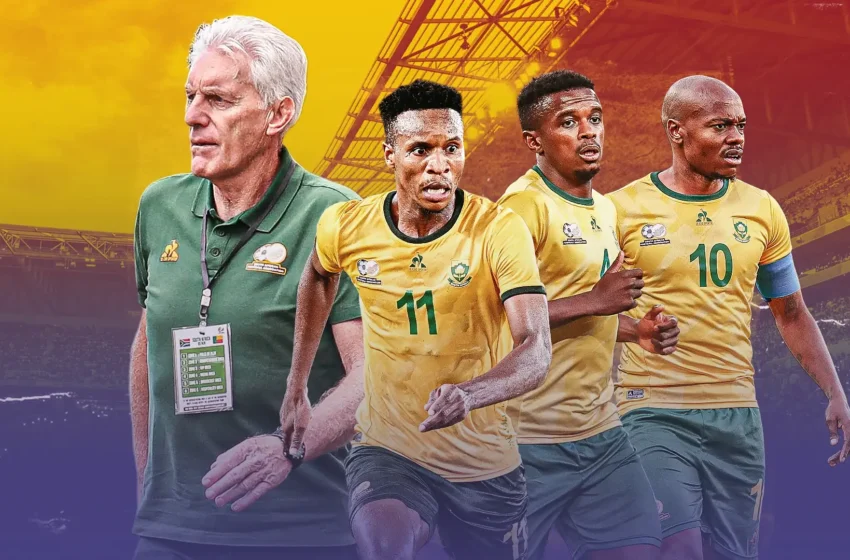What does South Africa need to qualify for 2026 World Cup? Here’s all to know

Bafana Bafana’s path to 2026 World Cup: What South Africa must do to qualify from Group C
South Africa head into their match with Rwanda in a tense Group C battle where little separates the top three. With Benin leading on 17 points, South Africa second on 15, and Nigeria third on 14, Bafana Bafana cannot afford anything less than a decisive result if they want to control their destiny. These standings put enormous pressure on Hugo Broos’ side to win and protect their goal difference heading into the final stretch.
Where the Table Stands and Why It Matters
The up-to-date Group C table shows Benin on 17 points, South Africa on 15, and Nigeria on 14 — a three-team scrap in which a single matchday swing can reshuffle the top spot. Given only the group winners qualify directly and the best four runners-up advance to a playoff, South Africa must aim to top the group outright or at least ensure an adjusted runner-up record strong enough to be among the best four second-placed teams. The practical result: home/away margins, goals scored, and defensive solidity are now as important as wins.
Tactical Priorities: What South Africa Must Do vs Rwanda
Tactically, South Africa should pursue a measured attacking plan that prioritises scoring while protecting their goal difference. That means pressing intelligently to create high-quality chances (not just quantity), exploiting wide channels, and minimising turnovers that fuel Rwanda’s counterattacks. Defensively, maintaining concentration and avoiding late concessions is essential — a single conceded goal can swing goal-difference comparisons used in both group and runners-up calculations. The team must strike a balance between urgency and composure. (CAF tie-breakers emphasise GD and goals scored after points.)
The Math: Scenarios That Keep Bafana Bafana Alive
If South Africa beat Rwanda, they would move to 18 points (depending on other fixtures) and place themselves firmly in the driver’s seat for automatic qualification. A draw keeps them within reach but leaves them vulnerable to Nigeria or Benin leapfrogging them; a loss could drop them to third and make playoff qualification unlikely. Because CAF excludes results vs the sixth-placed team when comparing runners-up, South Africa must maximise results against the top five in the group — not merely pad stats against the weakest opponent.
Strengths, Weaknesses, and the Big Risks
South Africa’s strengths lie in squad depth and experienced campaigners able to dominate possession and unlock defences. But recent administrative or on-pitch hiccups (including any disciplinary issues or earlier point adjustments in the campaign) have tightened margins. The biggest risk is undershooting in attack — narrow wins or draws may not produce the goal difference or goals-scored tally required if South Africa end up compared with other group runners-up. Mental toughness in a high-pressure match is therefore as critical as tactics.
Conclusion: Must-Win, With Eyes on Goal Difference
With Benin, South Africa, and Nigeria separated by just three points at the top, South Africa’s match with Rwanda is essentially a must-win if they want to keep control of Group C. Even with victory, the manner of the win matters — goals for and against will likely decide the final order or the runners-up comparisons. Bafana Bafana must combine attacking intent with defensive discipline to give themselves the best shot at direct qualification or a robust runners-up profile for the playoffs.
FAQs
Q1: What is South Africa’s current position in Group C?
South Africa currently sit second in Group C with 15 points, just two behind leaders Benin (17) and one ahead of Nigeria (14). The race remains wide open, with all three nations still in contention for top spot.
Q2: What does South Africa need to qualify for the 2026 World Cup?
To qualify directly, South Africa must finish first in Group C. If they end second, they’ll need to rank among the four best runners-up across CAF’s nine groups, which usually requires at least 13–14 points from key matches and a strong goal difference.
Q3: How do CAF’s new qualification rules affect South Africa?
CAF’s updated format means only group winners qualify automatically, while four best runners-up compete in playoffs for one final spot in the intercontinental round. Every goal, point, and head-to-head result now carries greater weight than before.
Q4: What are South Africa’s biggest strengths and weaknesses?
Their strength lies in tactical discipline, strong goalkeeping, and creativity through Percy Tau and Teboho Mokoena. However, finishing efficiency and maintaining concentration late in matches remain major weaknesses that could impact their goal-difference advantage.
Q5: What happens if South Africa lose to Rwanda?
A loss could drop them to third place, making automatic qualification nearly impossible. They’d then depend on other results and goal differences across the continent to sneak into a playoff berth as one of the best runners-up.
Q6: When and where will the South Africa vs Rwanda match be played?
The game takes place at Kigali Stadium in Rwanda during this international break — a critical fixture that could reshape Group C standings.

